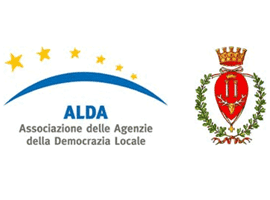
AT A GLANCE
This project is a pathway that combines different teaching methods, both face-to-face and distance learning, and integrates ‘traditional’ training with action-training interventions that allow for analysis and experimentation within the local community (classroom training is supplemented with project work that guarantees the testing of acquired knowledge in one’s own territorial reality). It is a participatory “process” since the proposal is developed in several stages and sees the involvement of the territory’s main players in the development of active citizenship and the promotion of participation at local level. It is divided into 3 different training modules, based on a participative-active methodology, followed by an equally important follow-up phase that aims to develop dialogue, cooperation and action between different actors in order to improve governance at local level.
It is an active citizenship ‘exercise’ in that the process includes moments of joint ‘work’ between the different participants, work based on case-studies and real hypotheses, to identify answers, solutions and practices, including new and innovative ones, to promote citizens’ participation and involvement in local decision-making processes. It also aims to strengthen the knowledge and skills of local authorities and civil society organisations interested in the topic of active citizenship. The “Active Citizens” Project is addressed to 20 administrators/employees of the Municipality of Brindisi, and to 20 representatives of civil society.
ACTIVITIES
The first training module includes two differentiated tracks for civil society and local authorities, so as to enhance – in this first phase – the specificities of the two main target groups. The main objective of this first module is to provide participants with the information and skills they need to better understand the local and European context on citizenship, their own role and the tools at their disposal to promote themselves as active players at local and community level.
The second training module is basically a citizenship exercise, i.e. a meeting in which, through debate and discussion, the start of a project work to be promoted and developed within the local community is experimented. The first two phases end with an experimental seminar activity called “Impossible encounters”, which aim to present possible situations and case studies in the field of active citizenship and European citizenship through encounters between different actors active in this field at European level.
The seminar activity consists of an open meeting – in the form of a round table – involving various European (and non-European) actors on the most relevant issues in the field of active citizenship and European citizenship.

THE PARTNER
The Municipal Administration of Brindisi, in line with the political guidelines of the European Union, intends to adopt all those tools and operational methods that allow the city community to project itself into a modern dimension, characterised by a common European feeling. Thus, a special councillor’s delegation has been set up and a series of training/action courses on ‘active citizenship’ have been launched. The expression ‘active citizenship’ is used to indicate a person’s conscious participation in political life and his or her full inclusion in the network of rights and duties that are constitutive of being a citizen, as well as the exercise of a responsibility of citizenship within the ‘public space’, so as to contribute to qualifying and enlarging it. Active citizenship’ is an expression, more appropriate to the current reality, of popular sovereignty; an expression no less important than that exercised in voting and in the delegation of representation in institutions; and it is a properly political expression. In turn, the ‘public space’ is the place where all subjects, individual and collective, who seek recognition and exercise citizenship responsibilities, express themselves. It is therefore also that dimension of public affairs where the state, in its various articulations, and the expressions of ‘active citizenship’ establish dynamic relations of a different nature. Administrative action is one of the privileged ways through which this dynamic is interwoven. Within the articulations of the state, the communal dimension of ‘public space’, in terms of deliberation and governance functions, takes on increasing prominence. The traditional way of conceiving the distinction between politics and administration is struggling to tune in to this evolutionary trend. And the same applies to the distinctions between public and private, civil and political. However, a substantial revision of the relationship is necessary to regenerate social legitimacy and the effectiveness of government action, as well as to restore credibility and attractiveness to politics. In this perspective, representative and administrative institutions exercise their responsibilities through administrative action, establishing places and procedures for communication and integration with citizenship. The promotion and enhancement of ‘active citizenship’ must be a real strategic priority of administrative action in the local and regional public space to the point of building real partnerships with ‘active citizenship’ organisations. Therefore, what the Brindisi municipal administration has planned on ‘active citizenship’ and, therefore, on European citizenship, is intended to contribute to bringing the social body in its various articulations – what is more commonly referred to as civil society – closer to the institutions and to the organisation of the public administration, which, although represented by the local authority, today appears to be increasingly distant from citizens’ understanding and dialogue with them. In the era of the nation state, politics acted on two levers: market and government. In the European Union, politics acts on three levers: economy, government and civil society. The European model constitutes a radical advance in the evolution of political life. In fact, the Municipality of Brindisi and ALDA have decided to organise an educational action to bring citizens closer to the Administration through European paths. Today, more than ever, it is important to realise citizens’ participation in public activity and political decisions more than just proclaiming it. The famous ‘glass palace’, i.e. transparency, is implemented by overcoming the citizen’s status as a voter and making him a truly active subject in public choices, but one that is continuously active and, above all, aware of his rights and powers. The objective must be that of an authentic European conscience marked by dialogue, sharing and, above all, a correct conception of freedom in the relationship between citizen and public authority.